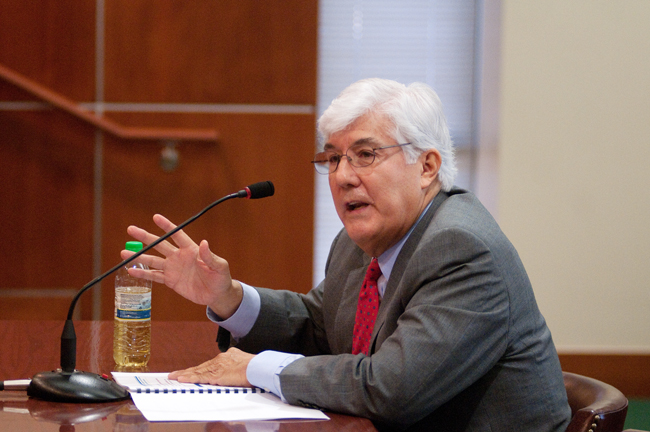While questions linger over the possibility of fixed-rate tuition, student finances may be further altered if state legislators choose to modify the dispersal of TEXAS grants to benefit incoming freshmen.
The Texas House of Representatives Appropriations Subcommittee met Tuesday to publicly hear testimony regarding proposals for various budget items such as student financial aid recommendations and education research funding.
TEXAS grants are awards of up to $7,400 per year for financially needy students who have an expected family contribution less than or equal to $4,000. Raymund Paredes, Higher Education Coordinating Board commissioner, said while the need for more TEXAS grants for eligible incoming students has increased to 73 percent over the last five years, the System will only be able to support 22 percent of these students the way the money is released now.
“To fully fund the TEXAS Grant program for the [2014-2015] biennium would be $1.2 billion,” Paredes said. “There’s nothing of course that I’ve heard from members of the Legislature that suggests that we can approach that number. In that context, it seems we have to make some modifications to the program and make it run somewhat differently.”
Paredes said the most efficient way to use TEXAS grant funds is to award the majority of the money to a higher number of eligible incoming freshmen, as a way to incentivize them to come to the University to begin with.
“We’ve found that initial awards are more important than continuing awards,” Paredes said. “Students who don’t receive an award are discouraged from going to college altogether, whereas students who receive that initial award and make it to their junior or senior year of education will find a way to finish. We have to adjust the balance.”
Biochemistry freshman Miguel Torre received a TEXAS grant this semester and said giving fewer students money later in their college career would put students in a tough spot later on and potentially result in higher transfer rates out of the University.
“It would be a good initial thing, but then I’d probably have to take out another loan or get a job,” Torre said. “You’re excited as a freshman, so I think that would give you more of a reason to come in, but you might regret it later. Transfer rates from here would be big, because it’s expensive here.”
The Legislative Budget Board presented the committee with an overview of seven higher education funds, which are awarded to eligible institutions to increase excellence in instruction and research, according to the documents submitted to the committee.
State Rep. John Otto, R-Dayton, said he was in talks with Rep. Dan Branch, R-Dallas and chairman of the House Committee on Higher Education, to determine whether five of these research funds could be consolidated into one fund with multiple tiers to benefit each eligible university.
The five funds are the Texas Competitive Knowledge Fund, the Research Development Fund, the Higher Education Fund, the Texas Research Incentive Program and the Norman Hackerman Advanced Research Program.
“We put all [these] different programs in place, and now we have some people who think they’re qualified but they’re not being included in the appropriation,” Otto said. “I think it’s maybe time to get the policy guys to relook at this so we know who we’re benefitting when we appropriate the money.”
Published on February 20, 2013 as "Representatives reexamine Texas grants".





















